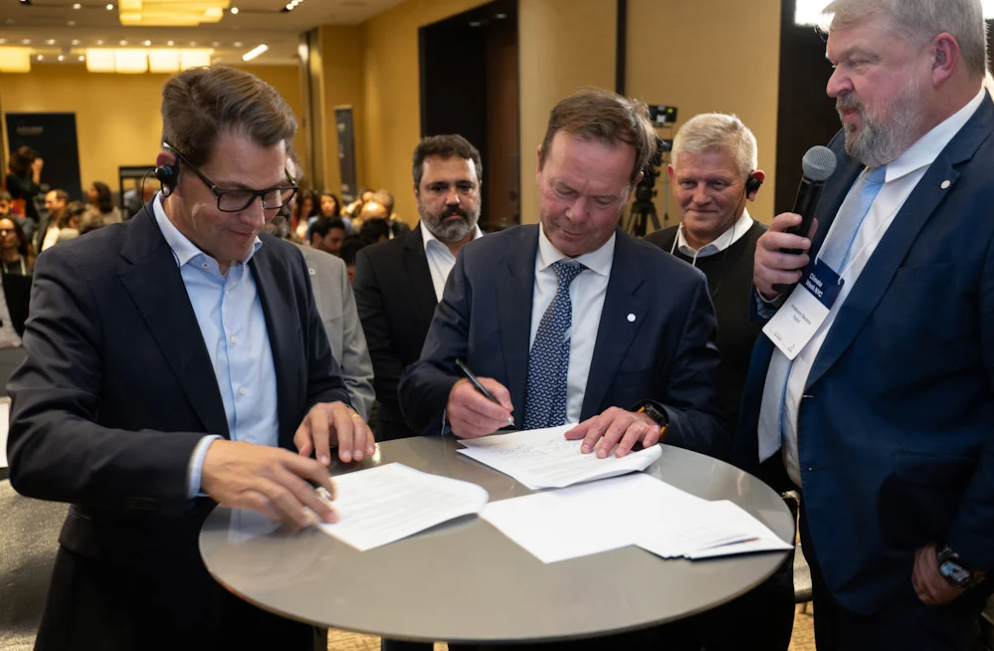Hydro & Mercedes-Benz launches Corridor Programme for sustainable development in the Amazon
The Norwegian aluminium and renewable energy company Norsk Hydro has extended its strategic partnership with the luxury automotive giant Mercedes-Benz to collaborate on a long-term initiative aimed at fostering positive social and environmental impacts in the Brazilian Amazon. Focussing on the same, both Hydro and Mercedes-Benz launched the long-term 'Corridor' Programme at the Climate Week 2024 in New York.

About the Corridor Program
The Corridor Programme is dedicated to creating positive impacts for people and nature in the Amazon. Through this initiative, Hydro and Mercedes-Benz will collaborate with Brazilian NGOs IPAM, Imazon, and CEA, alongside Boston Consulting Group and other partners. The goals of the programme include:
- Safeguarding human rights
- Boosting income for local communities
- Restoring natural ecosystems
- Developing low-carbon value chains in the region
"We are excited to further develop our strategic partnership with Mercedes-Benz, expanding our collaboration beyond low-carbon product development to create positive social and environmental impact in the Amazon. Working together, we aim to lift sustainability throughout our shared value chain, from mine to end-consumer product, while fostering economic opportunities and biodiversity conservation in the communities where we operate," said Eivind Kallevik, President and CEO of Hydro.
The program focuses on generating positive social impacts along the 244-kilometre bauxite slurry pipeline operated by Hydro in Brazil. This pipeline runs through seven municipalities in the State of Pará, connecting Hydro's bauxite mine in Paragominas to the Alunorte alumina refinery in Barcarena.
Pillars of the programme
This partnership builds upon the existing commercial agreement between Hydro and Mercedes-Benz. In 2022, the companies committed to a joint technology roadmap focused on developing aluminium solutions for automotive applications with a CO2 footprint of less than 3.0 kgCO2/kgAl to achieve near-zero aluminium by 2030.
Under the Corridor Programme in the Amazon, project identification will be led by the communities surrounding the pipeline area. This approach empowers local stakeholders to prioritise initiatives that benefit their regions, fostering a sense of ownership and alignment with the programme's overarching goals.
The programme will be anchored on three strategic pillars:
- Economic development
The programme will identify barriers to economic development and seek solutions to enhance the conditions for nature-based value chains in the area.
- Social developement
The programme will take a large-scale approach to social development, focusing on three key areas: (i) basic human needs, (ii) well-being, and (iii) opportunities. Its goal is to enhance the overall quality of life for residents in the region. The programme will explore practical methods to improve living conditions in communities, primarily in rural areas, while also addressing needs in urban centres. This includes ongoing collaboration with the Pará State Government through the TerPaz programme.
- Environment & bio-diversity conservation
The programme will focus on conserving biodiversity in the Amazon, which is essential for achieving positive outcomes for both nature and communities. It will prioritise identifying opportunities to reduce forest degradation as an initial target, with the broader aim of contributing to the regeneration of natural ecosystems.
Focus of the programme
The Corridor programme builds upon Hydro's established initiatives with local communities and leverages the extensive expertise of NGOs in the Amazon region to amplify its positive impact. Central to this effort is the long-term commitment of Hydro and its partners to the region, which strengthens their ability to engage influential brands like Mercedes-Benz in contributing to the area's development.
The Corridor Programme will operate in full compliance with Brazilian laws and regulations, reinforcing the project's legitimacy and ensuring that all activities are conducted within the country's legal framework. This commitment upholds the rule of law and promotes sustainable development practices.
It is estimated that the Corridor Programme could benefit approximately 8 per cent of Pará's population. A multi-institutional project organisation, the programme is made up of various companies and organisations. Partners include Hydro Brazil, Alunorte, Mineração Paragominas (MPSA), Mercedes-Benz, IPAM, IMAZON, CEA, the Hydro Sustainability Fund, and Boston Consulting Group.
Hydro's Commitment to Community Development
Since its establishment in 1905, Hydro has been dedicated to the development of the communities in which it operates. Through the Alunorte alumina refinery and Albras aluminium smelter, Hydro has made significant efforts to enhance the quality of life in Barcarena by supporting sanitation, environmental protection, education, sports, culture, and economic development initiatives. In recent years, the company has invested over 260 million BRL (approximately 47 million EUR) in 26 social programmes in and around Barcarena.
This news is also available on our App 'AlCircle News' Android | iOS


























